
Human Genetics Studies Reveal New Targets To Reduce Heart Disease
Again and again, it's the rare among humans that help the rest of us. The exploration of human genetics is revealing new targets to combat heart disease among atypical variants. Mutations in genes that play a role in heart health are the inspiration for a cluster of new heart drugs. One of the best examples is the discovery of mutations in the PCSK9gene. People with a variant of this enzyme have lower LDL levels (the bad cholesterol), which protects them against heart disease. The discovery led to the development of a new class of heart medications called PCSK9 inhibitors, which markedly reduce LDLs in people with out-of-control levels. At the annual meeting of the American College of Cardiology this past spring, researchers announced that these inhibitors reduced the combined risk of having a heart attack or stroke or dying from cardiovascular disease in high-risk patients by 15 percent.
Other investigators are extending the hunt for how these mutations affect risk to tackle other aspects of heart disease. For instance, people whose LDL levels are under control but have elevated triglycerides are still at risk for continued plaque buildup in their arteries. Individuals with mutations in genes that play a role in breaking down excess triglycerides in the blood are pointing geneticists to other ways to protect at-risk people. In fact, a recent New York Times article describes a trio of papers about these rare mutations in people with extremely low triglyceride levels. These studies followed a previous discovery that mutations in the APOC3 gene naturally cause extra-low triglyceride levels. Normally, the APOC3 gene instructs cells to make a molecule that inhibits the breakdown of triglycerides.
Daniel Rader, MD, chair of Genetics, and other Penn Medicine researchers, were coauthors on these recent human-genetic studies, as well as others earlier this year. All of the APOC3 variants are associated with low triglycerides, independent of LDL cholesterol levels. The findings represent a potential new and separate line of attack for lowering risk of heart disease.
"If we could harness the protective aspects of these APOC3 variants to develop therapies that act similarly and lower triglycerides and heart disease risk, these could theoretically work alongside existing LDL-lowering drugs," Rader said.
He adds that it's hard to say how many people have normal LDL but high triglycerides, "but it's clearly in the millions, not a small number." There are currently no proven therapies to further reduce risk in these individuals.
Studies of large groups of people with one disabled APOC3 gene have led to its characterization as a highly validated therapeutic target for reducing the risk of heart disease. In other words, these studies have shown that diminished function of APOC3 is consistently associated with lower triglyceride levels and reduced risk of heart disease in large populations across the world.
One new therapy targeting APOC3 is showing promise: an antisense oligonucleotide, which is essentially a small stretch of DNA that binds to the APOC3 RNAs to block the protein from being made. This antisense drugs, which is administered subcutaneously, has shown substantial reductions in triglyceride levels in humans, further proving that disabling the APOC3 protein works the way the researchers had hoped.
Therapeutic antibodies -- engineered molecules that bind to specific proteins on cell surfaces -- are an established way to inhibit or inactivate circulating proteins to treat disease, and Rader notes that creating antibodies to the AP0C3 protein may be another useful strategy. The recently approved antibody to the PCSK9 protein is one example of this approach in action for lowering LDL and reducing heart disease.
In the newest human genetics study from the Rader lab, the team studied people with one disabled copy of the APOC3 gene (found by searching the over 50,000 participants in the Penn Medicine Biobank) and mice expressing the same human variant and showed that both had markedly reduced levels of APOC3 protein and triglycerides in their blood. From this, they showed that an antibody targeting the APOC3 protein could accelerate the breakdown of triglyceride-rich lipoproteins in the mice, mimicking the effects of this natural mutation.
The APOC3 protein antibody was developed by the biotech firm Argenx in collaboration with Staten Biotechnology. Rader says this approach is currently being developed by Staten and could be in clinical trials within the next two years.
This new translational genetics study, Rader said, "adds one more check in the win column for the value of studying rare human genetic variants to inform our understanding of common conditions."
Materials provided by Perelman School of Medicine at the University of Pennsylvania. Original written by Karen Kreeger. Note: Content may be edited for style and length.
Disclaimer: DoveMed is not responsible for the accuracy of the adapted version of news releases posted to DoveMed by contributing universities and institutions.
References:
Sumeet A Khetarpal, Xuemei Zeng, John S Millar, Cecilia Vitali, Amritha Varshini Hanasoge Somasundara, Paolo Zanoni, James A Landro, Nicole Barucci, William J Zavadoski, Zhiyuan Sun, Hans de Haard, Ildikó V Toth, Gina M Peloso, Pradeep Natarajan, Marina Cuchel, Sissel Lund-Katz, Michael C Phillips, Alan R Tall, Sekar Kathiresan, Paul DaSilva-Jardine, Nathan A Yates, Daniel J Rader. (2017). A human APOC3 missense variant and monoclonal antibody accelerate apoC-III clearance and lower triglyceride-rich lipoprotein levels. Nature Medicine. DOI: 10.1038/nm.4390
Related Articles
Test Your Knowledge
Asked by users
Related Centers
Related Specialties
Related Physicians
Related Procedures
Related Resources
Join DoveHubs
and connect with fellow professionals

0 Comments
Please log in to post a comment.